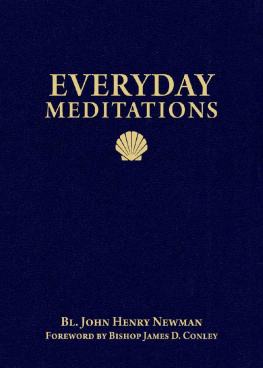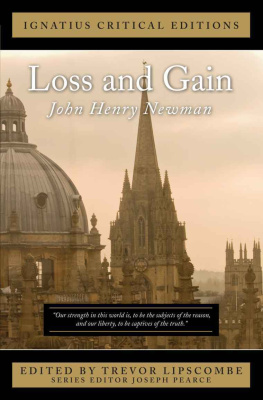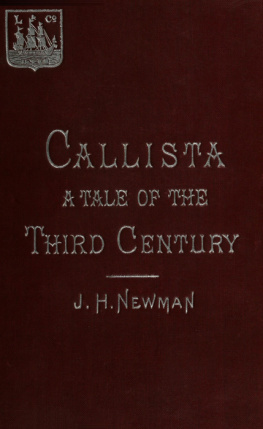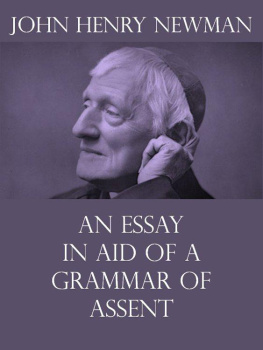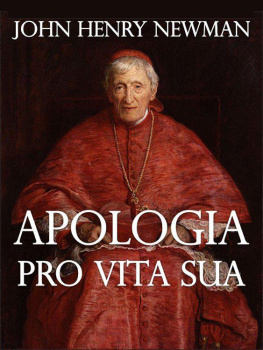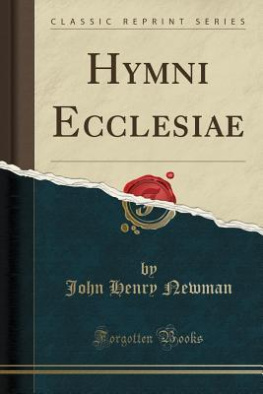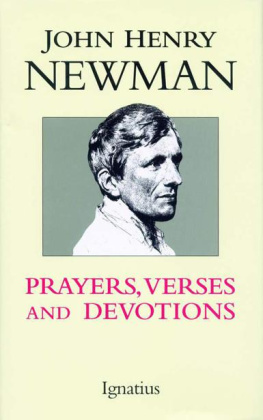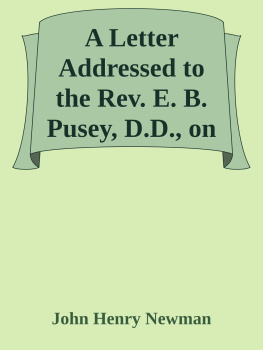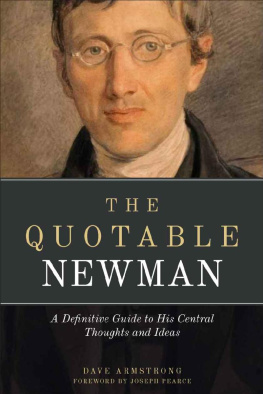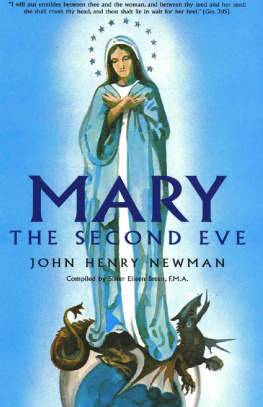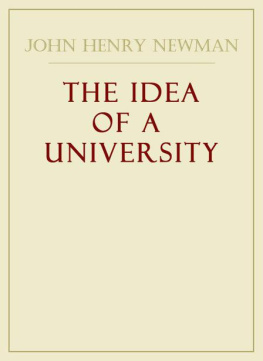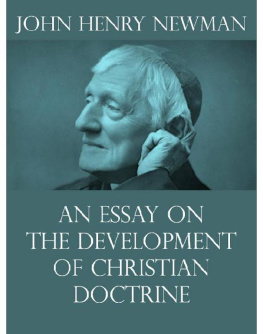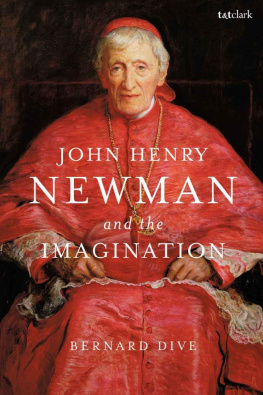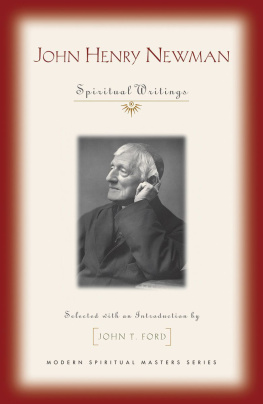John Henry Newman - Everyday Meditations
Here you can read online John Henry Newman - Everyday Meditations full text of the book (entire story) in english for free. Download pdf and epub, get meaning, cover and reviews about this ebook. year: 2013, publisher: Sophia Institute Press, genre: Religion. Description of the work, (preface) as well as reviews are available. Best literature library LitArk.com created for fans of good reading and offers a wide selection of genres:
Romance novel
Science fiction
Adventure
Detective
Science
History
Home and family
Prose
Art
Politics
Computer
Non-fiction
Religion
Business
Children
Humor
Choose a favorite category and find really read worthwhile books. Enjoy immersion in the world of imagination, feel the emotions of the characters or learn something new for yourself, make an fascinating discovery.
- Book:Everyday Meditations
- Author:
- Publisher:Sophia Institute Press
- Genre:
- Year:2013
- Rating:4 / 5
- Favourites:Add to favourites
- Your mark:
- 80
- 1
- 2
- 3
- 4
- 5
Everyday Meditations: summary, description and annotation
We offer to read an annotation, description, summary or preface (depends on what the author of the book "Everyday Meditations" wrote himself). If you haven't found the necessary information about the book — write in the comments, we will try to find it.
Everyday Meditations — read online for free the complete book (whole text) full work
Below is the text of the book, divided by pages. System saving the place of the last page read, allows you to conveniently read the book "Everyday Meditations" online for free, without having to search again every time where you left off. Put a bookmark, and you can go to the page where you finished reading at any time.
Font size:
Interval:
Bookmark:
Blessed John Henry Newman is remembered for the brilliance of his mind and the persuasive power of his writing. But above all, Newman touches the heart. He wins the reader with clarity and beauty, as evidenced on every page of this wonderful book. His work is a labor of joy; it changes us for the better. Everyday Meditations is the kind of book that, if taken to heart, draws us into the arms of God.
+Charles J. Chaput, O.F.M. Cap.
Archbishop of Philadelphia
John Henry Newman
Everyday Meditations
SOPHIA INSTITUTE PRESS
Manchester, New Hampshire
Everyday Meditations is taken from the section Meditations on Christian Doctrine in Meditations and Devotions of the Late Cardinal Newman , published by Longmans, Green, and Company, London, in 1916. This 2013 book by Sophia Institute Press includes minor editorial revisions and a new introduction.
Copyright 2013 Sophia Institute Press
Printed in the United States of America
All rights reserved
Cover design by Carolyn McKinney
No part of this book may be reproduced, stored in a retrieval system, or transmitted in any form, or by any means, electronic, mechanical, photocopying, or otherwise, without the prior written permission of the publisher, except by a reviewer, who may quote brief passages in a review.
Sophia Institute Press
Box 5284, Manchester, NH 03108
1-800-888-9344
www.SophiaInstitute.com
Sophia Institute Press is a registered trademark of Sophia Institute.
Library of Congress Cataloging-in-Publication Data
Newman, John Henry, 1801-1890.
[Meditations and devotions of the late Cardinal Newman.]
Everyday meditations / John Henry Newman.
pages cm
ISBN 978-1-933184-96-8 (pbk. : alk. paper) ePub ISBN 978-1-622821-65-5
1. Meditations. 2. Catholic Church Doctrines Meditations. I. Title.
BX2182.3.N45 2013
.2 dc23
2013004087
Contents
Introduction
Blessed John Henry Newman: A Teacher of Everyday Conversion
by Bishop James D. Conley
Blessed John Henry Newman has a way of changing lives. Perhaps he has already changed yours in some way. Or perhaps he soon will, through these Everyday Meditations .
Newmans influence on my life is profound. His writings drew me into the Church as a young college student and helped me discern my priestly vocation.
Whether you are a newcomer to Newman, or a longtime reader of his works, you will find treasure in these devotional writings of Englands most illustrious Catholic convert.
It is possible to appreciate these meditations without knowing Newmans own story. His love of the Lord speaks for itself on every page. But John Henry Newmans life is an inspiring piece of Catholic history, and it always helps to be acquainted, or reacquainted, with the person we take as our spiritual guide.
* * *
John Henry Newman was born in 1801, the son of a banker and the oldest of six children. Born into a century of skepticism, John questioned the Bible and doubted the immortality of the soul. The young Newman had a yearning for truth but this passion was tainted with pride. His pride led him into serious doubts and even the deliberate rejection of Gods voice.
But at age fifteen he underwent a dramatic Christian conversion, recounted in one of this volumes meditations:
O my God, that overpowering love took me captive. Was any boyhood so impious as some years of mine! Did I not in fact dare you to do your worst? Ah, how I struggled to get free from you; but you are stronger than I and have prevailed. I have not a word to say, but to bow down in awe before the depths of your love.The young Newman became a fervent evangelical Christian. But he had not yet found the fullness of faith and truth: In course of time, slowly but infallibly did your grace bring me on into your Church.
Feeling called to ministry, Newman was ordained in the Anglican Communion in 1825. He abandoned low-church evangelicalism, embracing liturgical worship and the early Church Fathers. During the 1830s, he spearheaded the Oxford Movement, recovering many ancient Christian traditions.
But was Anglicanism, with its sixteenth-century Protestant roots, really the Church? By 1841, Newman was no longer sure. After all, Christs Church was no human invention. Its teachings were not a matter of personal interpretation. As Newman reflected in a later meditation: The Church is your work, your establishment, your instrument.... We are under your rule, your laws and your eye.... When the Church speaks you do speak.
Only the Catholic Church spoke with Christs authoritative voice. In 1845, after writing his Essay on the Development of Christian Doctrine, Newman left Anglicanism and became a Catholic.
Newmans Catholic conversion was the fruit of much thought and prayer, but it was also like his youthful Christian conversion an unmerited gift of Gods grace:
I adore you, almighty Lord... because you in your infinite compassion have brought me into this Church, the work of your supernatural power. I had no claim on you for so wonderful a favor over anyone else in the whole world. There were many men far better than I.... Yet you, in your inscrutable love for me, have chosen me and brought me into your fold.He asked God to make him worthy of this gift:
Now then give me this further grace, Lord, to use all this grace well and to turn it to my salvation.... Give me a love of your sacraments and ordinances.... Without you I can do nothing, and you are there where your Church is and your sacraments.Newman was ordained a Catholic priest in 1846 and joined the Oratory of St. Philip Neri. Over the next four decades, he undertook various pastoral and intellectual works including an apostolate among the poor and the foundation of Irelands first Catholic university. Although his life as a Catholic priest was challenging, he never doubted his choice to join the one fold of the redeemer.
Blessed John Henry Newman lived to see his achievements honored, especially through his 1879 appointment as a cardinal. Since his death in 1890, his reputation as a priest and author has only grown.
* * *
Cardinal Newman is known for his theological writings, which strengthened the Churchs intellectual credibility in the modern world. He foresaw the rise of relativism the belief that individuals can have their own truth and fought it on many fronts. His arguments for the Catholic Faith have inspired many conversions, including mine.
But Newman did not set out to be a public intellectual. His goal in life was something much simpler and harder. John Henry Newmans goal was to imitate and proclaim Jesus Christ; to serve God and love his neighbor as himself; to know the Lord and make him known.
It is this side of Newman, his heart as a disciple and preacher that we encounter in these Everyday Meditations . Here we discover Newman as the teacher of a different kind of conversion: the ongoing growth in sanctity to which Christs faithful are constantly called.
All of us need this everyday conversion no matter how well we know our Faith or how long we have practiced it. This deepening of faith and love is sometimes known as the second conversion. It builds upon our initial reception of grace in Baptism.
The Catechism of the Catholic Church describes the second conversion as an uninterrupted task for the whole Church (CCC 1428). This everyday conversion draws us more deeply into the mystery of Christ, joining our lives to his in every way.
To follow Jesus completely, we must undergo both of these conversions: the initial acceptance of truth and the lifelong process of transformation by the Holy Spirit. John Henry Newman is a wise and kindly guide for those undertaking this journey of deeper conversion just as he is for those first finding their way to the one Church of Christ.
* * *
Next pageFont size:
Interval:
Bookmark:
Similar books «Everyday Meditations»
Look at similar books to Everyday Meditations. We have selected literature similar in name and meaning in the hope of providing readers with more options to find new, interesting, not yet read works.
Discussion, reviews of the book Everyday Meditations and just readers' own opinions. Leave your comments, write what you think about the work, its meaning or the main characters. Specify what exactly you liked and what you didn't like, and why you think so.

